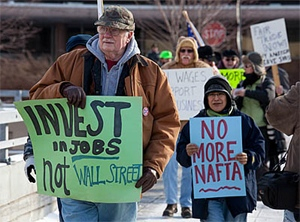Trade Rep's Plan Won't Stop Murders of Colombia Unionists

The U.S. Trade Representative announced a new “action plan” Wednesday to improve Colombia’s horrific history of thousands of unpunished murders of union activists.
The plan attempts to smooth the way for the Colombia Free Trade Agreement in Congress in coming months, where unions, environmentalists, farm, faith, and peace groups have lobbied against it on the basis of Colombia’s appalling human rights record.
The Steelworkers and AFL-CIO President Rich Trumka opposed the deal, saying the “situation in Colombia remains unacceptably violent.”
The administration’s announcement of the “action plan,” which gives Colombia two months to strengthen its labor laws and commits the government to hire more inspectors, came the same week as two more union leaders were murdered.
Fifty-one were killed last year, up from 37 four years ago. At least 2,850 unionists have been killed in the last 25 years—making Colombia by far the most dangerous place to be a union activist in the world.
Trumka noted that because the action plan is a side arrangement not included in the actual trade deal, the U.S. government will have no leverage whatsoever to enforce its terms.
“We have no doubt that if 51 CEOs had been murdered in Colombia last year, this deal would be on a very slow track indeed,” he said.
Jeff Crosby, president of an IUE-CWA local at a Boston-area GE factory, has taken a half-dozen trips to Colombia to meet with unionists there, as well as government officials, military representatives, women’s groups, and academics. He says the Obama administration’s “action plan” is PR, not policy.
“To say the Colombian government will protect unionists is absurd,” Crosby said. “The agency charged with protecting them has been exposed as being infiltrated by the same forces that kill unionists.”
While the number of killings has been halved in the last eight years, Crosby said it’s not because the human rights situation has improved.
A widening scandal in the Colombian military has shown that it shoots people in urban areas and moves their bodies to rural zones, dressing them in guerrilla uniforms to claim they are combatants.
Plus, Crosby said, the decades of extreme violence have vastly reduced union numbers. Workers under a collective bargaining agreement now make up less than 1 percent of the workforce. Eight out of nine workers are misclassified as independent contractors, lacking the individual legal rights of employees. Company unions set up by management are making gains.
“Finding someone working under a legitimate union contract in Colombia is as rare these days as finding a GE subsidiary paying taxes,” Crosby said.
If the Obama administration was serious about improving labor’s position in Colombia and “not doing the bidding of American companies like Coca Cola and Drummond mines that have profited from the violence,” Crosby said, it would use the enticement of a trade deal to force Colombia’s ferociously anti-union elite to change its ways.
Some U.S. unions will fight the Colombian trade deal hard. They have spent years nurturing ties with Colombian counterparts, offering material aid, sponsoring delegations to each other’s countries, and letting policymakers know they’re monitoring the treatment of Colombian unionists.
“They tell us the visibility of U.S. support is very helpful in keeping them alive,” Crosby said.
His regional union, CWA’s District 1, has made yearly contributions to a public sector union in Medellín, SINTRAOFAN. Crosby says the money has helped provide protection for Hector Giraldo, the union’s secretary-general, as well as a computer for the union office.
The member-to-member connections made during the delegations teach U.S. unionists that corporate trade deals hurt not only Americans but workers in other countries, too.
Giraldo’s compatriots oppose the trade deal, Crosby said, because they expect it will lead to job loss in the country’s chicken-processing and agricultural sectors (much as NAFTA decimated Mexican corn farmers).
“That will create more desperate people who will increasingly try to get to the U.S.,” Crosby said. “This deal will increase pressure on the working class in this country and in Colombia.”





